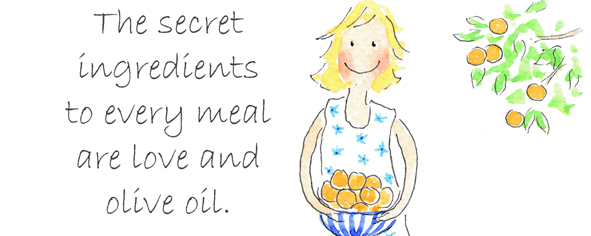Olive oil 25 g +4.6 years
Olive oil 25 g +4.6 years
How much of the liquid gold of olive oil are you ingesting? Is it a coincidence that the world’s oldest, Frenchwoman Jeanne Calment from Provence, who lived to be 122 years old, poured olive oil on all her food and olive oil on her skin as a beauty product every day? She said the secret to her excellent health and skin was olive oil. Olive oil cares for the skin on the outside and the heart on the inside.
I use it as a massage oil, spread on bread, in cooking, and let it add flavor to air-popped popcorn. I choose another if olive oil cannot replace the fat in a recipe. My love for olive oil is not unrequited – it brings love to my heart.
The gnarled olive tree hides beauty in its interior, and the wood can be used for bowls and spoons. Imagine resting in the shade of a large olive tree in the garden with a harvest that covers your needs. My travels along the Mediterranean awakened my love for its food with the olive oil on the table.
In Spain, the most olive oil is pressed in the world, and the Greeks consume the most, with 24 l per person per year. Swedes only eat 600 g of olive oil per year on average. Olive oil accounts for 2% of the world’s production of edible oils and 95% of olive oil is produced around the Mediterranean.
The olive tree yields 30 kg of olives annually, producing 4 l of olive oil. Olive trees live an average of 300-600 years and can be over 2000 years old with wider and gnarlier trunks. Olive trees are harvested at 5-10 years, and after a hundred years, the harvest declines. The difference between green and black olives is the level of ripeness at harvest. Green unripe olives taste slightly bitter, while black olives contain more oil and less salt.
The olive branch is associated with peace, and already around 10,000 years ago, we used the olive tree, which a couple of thousand years later gave us olive oil. The oldest clay vessel found where olive oil was stored is a 5,500-year-old amphora (two-eared vessel from antiquity).
Positive effects: A study of 90,000 people under 28 showed that those who ate more than half a tablespoon (7 g) of olive oil daily had a -19% lower risk of dying than those who rarely or never ate olive oil. The olive oil group had a lower risk of death: -19% from heart disease and stroke, -17% from cancer, -18% from respiratory disease, and -29% risk from dementia.
The researchers estimated that replacing 10 g of fat (margarine, butter) with 10 g of olive oil daily reduces the risk of death by 34%.
Olive oil lowers the risk of death with good fat and plant compounds. It positively affects blood pressure and cholesterol, is anti-inflammatory, has anti-cancer properties, and encourages healthy gut bacteria.
https://www.jacc.org/doi/full/10.1016/j.jacc.2021....
Be confident with the scientific names of olive oil’s gifts from Mother Earth. Hydroxytyrosol is a phenolic compound found in extra virgin olive oil, and its biological metabolite is known as HVAL.
A study of 1,851 participants published in 2017 in the American Journal of Clinical Nutrition found that high HVAL concentration lowered the risk of cardiovascular disease and mortality in older persons. The study showed that those in the highest quintile (20% of participants) of HVAL concentration compared to the lowest (20% of participants) lived an extra 9.2 years and had an average of 6.3 additional years free from cardiovascular disease after age 65. Extra virgin olive oil gives a high HVAL concentration.
https://www.researchgate.net/publication/316523416...
We apply the precautionary principle and attribute half of the different lifespans to 4.6 years.
Studies also show that those who consumed the most olive oil had a 51% lower risk of bone fracture.
Garcia-Gavilan JF, Bullo M, Canudas S, et al. Extra virgin olive oil consumption reduces the risk of osteoporotic fractures in the PREDIMED trial. ClinNutr. 2017.
Tip: Choose organic extra virgin olive oil from the first pressing of the olives without chemicals. Cold-pressed means the oil has not been heated above 27 °C and retains nutrients and vitamins. The time from harvesting to pressing should be less than 24 hours for a fresh and clean taste.
Olive oil is best stored in a dark and cool place, lasting up to 2 years without losing nutrients. Use olive oil-based organic soap and skin care products. Extra virgin is the highest quality for olive oil - it is often adulterated, so make sure you have the real thing.
The myth says Athena brought the olive tree and olive oil to Greece. Athena and Poseidon competed for power over Athens, showering each other with gifts. Poseidon gave a sacred lake to the Acropolis, and Athena gave an olive tree. Athena won as the olive tree lived for 500 years and produced edible fruit that was the source of oil for food, to heal wounds and illnesses, and to light homes.
The Frenchman Chazan-Gillig wrote in Olivae that the olive tree has been the symbol of unity in the Mediterranean area since Roman times. Thanks to the tree’s life, it is a signpost for the emergence of culture and civilization. Let olive oil become a part of your life, as it can reward you with a better and longer life.





